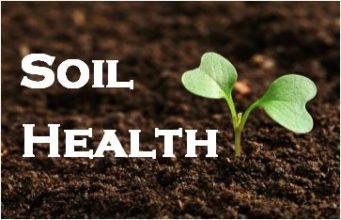Soil Health Management is a set of practices and strategies aimed at maintaining and improving the health of soil to ensure sustainable agricultural productivity, environmental quality, and ecosystem resilience. It focuses on preserving soil fertility, enhancing microbial activity, and mitigating soil degradation caused by intensive farming and climate change. Objectives of Soil Health Management • Improve soil fertility and nutrient balance. • Enhance organic matter content and microbial diversity. • Promote sustainable agricultural practices. • Reduce soil erosion and degradation. • Encourage the efficient use of chemical fertilizers and organic inputs. • Support climate resilience and adaptation. Key Principles of Soil Health Management 1. Minimal Soil Disturbance: Reduce tillage to maintain soil structure and prevent erosion. 2. Diverse Crop Rotations: Implement crop diversity to improve nutrient cycling and soil biodiversity. 3. Organic Matter Integration: Incorporate organic amendments like compost and bio-fertilizers to enrich the soil. 4. Soil Cover: Use cover crops and mulching to protect the soil from erosion and nutrient loss. 5. Efficient Resource Management: Optimize water, fertilizer, and pesticide use to prevent pollution and degradation. Soil Health Management Practices 1. Soil Testing and Nutrient Management: • Conduct regular soil tests to assess nutrient levels and pH. • Apply site-specific fertilizers based on soil analysis. 2. Use of Organic Inputs: • Compost, bio-fertilizers, and green manure improve soil structure and biological activity. • Promote Vermicomposting to enhance organic matter. 3. Conservation Tillage: • Adopt zero or reduced tillage to maintain soil integrity and reduce erosion. 4. Agroforestry & Intercropping: • Integrate trees and multi-cropping systems to enhance biodiversity and soil health. 5. Water Management: • Implement rainwater harvesting and micro-irrigation to optimize water use. 6. Crop Residue Management: • Avoid burning and instead return crop residues to the soil as organic mulch. Government Programs Supporting Soil Health Management in India 1. Soil Health Management Scheme (SHM): • A sub-mission under the National Mission for Sustainable Agriculture (NMSA) focusing on improving soil health through testing, capacity building, and promoting organic inputs. 2. Soil Health Card Scheme: • Provides farmers with soil health reports, guiding appropriate fertilizer use to enhance productivity. 3. Paramparagat Krishi Vikas Yojana (PKVY): • Promotes organic farming through cluster-based approaches and encourages chemical-free agriculture. Role of Soil Health in Climate Resilience • Carbon Sequestration: Healthy soils capture and store atmospheric carbon, mitigating climate change. • Drought Resistance: Improved soil structure enhances water retention, reducing vulnerability to drought. • Biodiversity: Supports a diverse microbial ecosystem essential for nutrient cycling and disease suppression.


